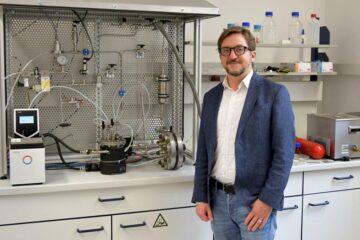Optical Pulse Shaping for Enhanced Separation of molecules and isotopes

<strong>Background</strong><br>
The separation of gas molecules and isotopes is of great interest for analytical purposes. Furthermore, pure radio isotopes are required in nuclear medicine for diagnostic procedures and radiotherapy.<br><br> <strong>Technology</strong><br> This method and device enables the separation of gas molecules having different excitation spectra. Therefore it is possible to separate molecules with different chemical and/ or physical properties as well as to separate isotopes. The molecules are excited by laser pulses. Due to multi-photon absorption the molecules to be separated are transferred into a multi-excited or ionized state in which they can be separated from other gas components. Multi-excited molecules can be extracted chemically or by electromagnetic field and ionized molecules can be separated by electrostatic field (e.g. quadrupole mass spectrometry). The extracted molecules are analyzed and the laser pulses are shaped (amplitude, phase, duration) by an iterative process depending on feedback analysis of the extracted molecules. This procedure is repeated until the composition of the extracted molecules is optimized according to a predefined composition.<br><br> <b>Benefits:</b><br> <ul> <li>Enables separation of molecules without prior analysis</li> <li>Evolutionary Algorithm → no prior calculations are required</li> <li>Exact calculations are not necessary due to the iterative process </li> </ul><br> <strong>IP Rights</strong><br> German patent DE 103 36 057 B4 <br> US Patent US 7,276,103 B2 <br> <br> <strong>Origin</strong><br> Freie Universität Berlin, Germany
Weitere Informationen: PDF
ipal GmbH
Tel.: +49 (0)30/2125-4820
Ansprechpartner
Dr. Dirk Dantz
Media Contact
Alle Nachrichten aus der Kategorie: Technologieangebote
Neueste Beiträge

Ideen für die Zukunft
TU Berlin präsentiert sich vom 22. bis 26. April 2024 mit neun Projekten auf der Hannover Messe 2024. Die HANNOVER MESSE gilt als die Weltleitmesse der Industrie. Ihr diesjähriger Schwerpunkt…

Peptide auf interstellarem Eis
Dass einfache Peptide auf kosmischen Staubkörnern entstehen können, wurde vom Forschungsteam um Dr. Serge Krasnokutski vom Astrophysikalischen Labor des Max-Planck-Instituts für Astronomie an der Universität Jena bereits gezeigt. Bisher ging…

Wasserstoff-Produktion in der heimischen Garage
Forschungsteam der Frankfurt UAS entwickelt Prototyp für Privathaushalte: Förderzusage vom Land Hessen für 2. Projektphase. Wasserstoff als Energieträger der Zukunft ist nicht frei verfügbar, sondern muss aufwendig hergestellt werden. Das…

















